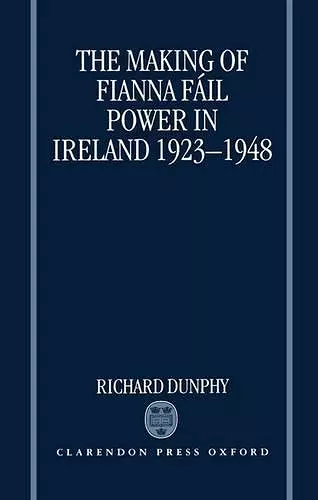The Making of Fianna Fáil Power in Ireland 1923-1948
Format:Hardback
Publisher:Oxford University Press
Published:13th Jul '95
Currently unavailable, and unfortunately no date known when it will be back

This is the first major study of the origins, development, and strategies of Fianna Fail; showing how the party achieved its central role in Irish politics. Dunphy explores its historical development, looking at its organizational structure, the evolution of party ideology, and the interactions between party and state. He analyses how the changing social structure of Ireland affected Fianna Fail policies, and demonstrates how the inadequacies of rival political parties' responses to crises benefited Fianna Fail. The author locates the historical experience of Fianna Fail rule in Ireland within the broader dimensions of European politics. The result is a fascinating mixture of detailed empirical research and broader theoretical analysis which reconstructs Fianna Fail's rise to power and explains how it retained its position of dominance.
This scholarly study, the most ambitious yet undertaken on the party, is an attempt to fill the gap. It is a highly impressive work. This study marks a major advance on our understanding of Fianna Fail and of Irish politics in general. * The Irish Times *
A full portrait of Fianna Fail's successful endeavour to make itself the hegemonic voice in Irish political culture. * Irish Political Studies *
a full portrait of Fianna Fail's successful endeavour to make itself the hegemonic voce in Irish political culture. * Irish Political Studies *
the first major book-length academic study of the Fianna Fáil party ... The book is well researched ... Dunphy has used the superb Archives Department of University College, Dublin, to very good effect ... we have been given a highly competent economistic study of de Valera's Fianna Fáil. * Tom Garvin, University College, Dublin, Irish Historical Studies *
a major contribution to Irish history ... Dunphy has explored an impressive range of primary materials and has read widely in both Irish studies and in theoretical literature ... this is ... an excellent piece of scholarship, lucidly presented and cogently argued. It will be required reading for all interested in Irish and West European politics. * John Kendle, University of Manitoba, History, Spring 1996 *
This detailed and fascinating study ... should be of interest not only to specialists of Irish political history, but also to those scholars studying the processes of democratization in East and Central Europe ... Dunphy has managed to scour all available sources to provide a thorough, well-written exposition on the origins of this mass party, on its role in the development of 'modern' Ireland ... a must for any self-respecting book collection on party politics! * David N. Farrell, University of Manchester, Political Studies, Vol. 45, No. 1, March '97 *
an incisive account of the Fianna Fáil Party during the quarter century of the Irish Free State's existence ... Based on sometimes elusive archival materials, newspapers and periodicals, and abundant secondary sources, Dunphy's keen analysis offers a rich feast for connoisseurs of Irish history and politics. * R.H. Thompson, Indian University-Purdue University, Columbus, Choice, March 1996 Vol.33 No.7 *
Richard Dunphy's study is particularly welcome, as it is the first comprehensive assessment of the party during its formative period of growth (1926-48). In successive chapters he adds much to our understanding of the growth of the party, provides a detailed analysis of policy during Fianna Fáils early governments (1932-38), and seeks to explain the erosion of party strength during and immediately after World War II. * Brian Girvin, University of Glasgow, West European Politics, Vol. 20, No. 2, April '97 *
rich and thoroughly researched analysis ... apart from being essential reading for any student of Irish politics, it can also teach a lot to others * Peter Mair, University of Leiden *
ISBN: 9780198204749
Dimensions: 226mm x 146mm x 26mm
Weight: 577g
356 pages